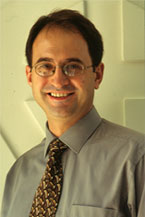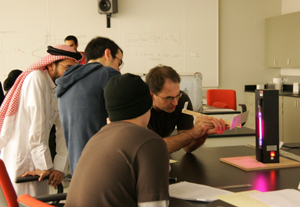WCMC-Q "opened up new avenues" says physics lecturer

Bogomil Gerganov, Ph.D.
As he prepares to leave Doha to return to Cornell University in Ithaca, lecturer in physics, Bogomil Gerganov, Ph.D., looks back on the past two and a half years at WCMC-Q as an extremely positive experience, living in a part of the world he had never seen before.
Tasked initially with setting up and teaching the labs for physics 207/208, he went on to lecture in the course, to take part in activities organized for the annual Cornell summer reading project during orientation weeks, and to participate in a number of committees. Dr. Gerganov singles out experience of the admissions process for opening up new areas of interest. "It got me thinking about so many issues," he comments, "culture, education, language, learning."
He points out that joining a new and pioneering academic institution brings particular rewards: "You gain a totally different level of insight into the institution than if you were working in one that is already established."
It was a sense of adventure that brought Gerganov to Doha back in January 2003. "I was excited about Cornell opening a branch here. It was a more challenging teaching experience, in the good sense: I was to build the physics labs. This seemed a great opportunity to teach in a new setting and develop something from scratch."

Having signed up for one year initially, Gerganov stayed on to teach a total of three pre-medical classes.
And this despite the fact that he arrived in Doha only shortly before the outbreak of the war in Iraq.
Asked if he had any qualms about coming to the Gulf at a time of impending crisis, Gerganov responds that there were doubts before he left the U.S. — but none once he arrived in Doha. After the outbreak of the war, he recalls that the feeling of uncertainty over what might happen was countered by a strong determination among the leadership, faculty and staff to keep the Medical College open.
"This is consistent with the spirit of Cornell in Ithaca," he notes, "Cornell doesn‘t stop its operations — no matter what. We feel that our mission — promoting education — is so important that we should not allow it to be interrupted, unless it‘s really necessary."
If coming to the Middle East was an adventure for him, what did he make of Doha on his arrival?
To his surprise, with its car-oriented way of life and spacious shopping malls, it felt quite like a town in the U.S., Gerganov — who is of Bulgarian origin — recalls. This was not quite what he was expecting and, unlike most expatriate westerners, he chose to live in the downtown area among the hustle and bustle of the traditional markets or souqs, where he could soak up a more authentic Middle Eastern atmosphere.
As lecturer in physics, Gerganov has shared teaching the pre–med students with senior lecturer Marco Ameduri, Ph.D., a colleague with whom he had worked closely at Cornell in Ithaca. Reflecting on the characteristics of the students at WCMC–Q, Gerganov feels that the Inaugural Class had an unusual, pioneering approach and an outstanding intellectual curiosity — features that remain true of a proportion of students in the succeeding classes.
"The Inaugural Class were people who decided to sign up to something that was new. It wasn‘t entirely clear what it was going to be, and some people suspected that it would not work . . . so they took a risk by coming here. I think they did this because they had the same adventurous and pioneering spirit that many of the faculty had."
He notes the very strong sense of community at WCMC-Q. "We felt that we were all building this together: faculty, deans, students, administrative staff. We were all working together towards a common goal."
Dedicated to his career as a physicist, Gerganov regards the successful establishment of the physics labs at WCMC-Q as a major achievement, and he pays tribute to lab assistant Syed Ahmed Hasanin for his contribution. For example, given the emphasis on using everyday items in the labs, to show how physics is connected to our daily lives, they relied on Ahmed'‘ local knowledge to find some of the materials needed.
As he returns to Ithaca this month, Gerganov takes with him a resolve to move back into research in addition to fulfilling his teaching commitments. Again, working at WCMC-Q has provided new insight into an area of research that had interested him for some time: biophysics.
"The biological and medical talks and courses have opened up new avenues to explore," he comments, "I was naturally exposed to those kinds of subjects at WCMC-Q. When I go back, I will very seriously consider going into biophysics."
He is also keen to spread the word about WCMC-Q. For Gerganov, it is very important to ensure that this groundbreaking educational project is more widely known and understood.
